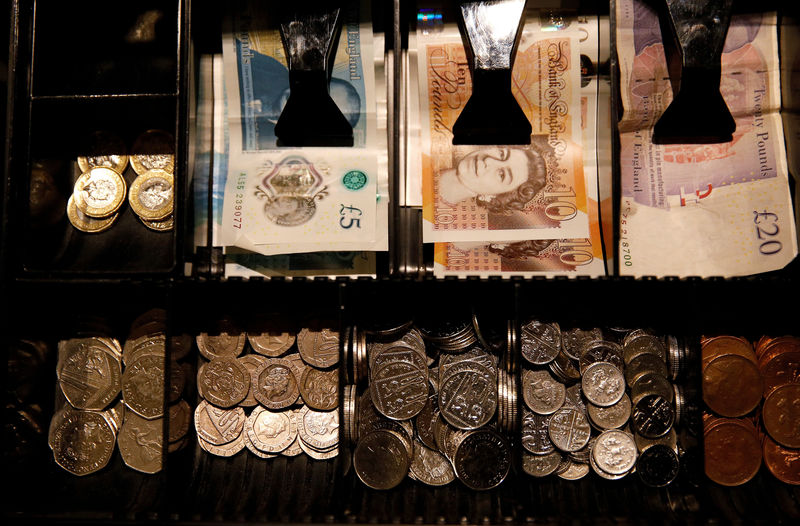By Tommy Wilkes
LONDON (Reuters) - Sterling slumped below $1.20 on Tuesday to its weakest in three-years, as Prime Minister Boris Johnson's implicit ultimatum to lawmakers to back him on Brexit or face an election sent investors scrambling to dump British assets.
The pound, which has lost 20% of its value since Britain voted to leave the European Union in 2016, fell to as low as $1.1959 , down nearly 1% on the day.
Barring an October 2016 'flash crash' when sterling momentarily tanked to as low as $1.15, the British currency has not regularly traded at these levels since 1985.
Traders in London said it was the heightened uncertainty that was panicking investors.
Many fear that Britain will either crash out of the bloc on Oct. 31 without a transitional deal to ease the divorce, or face a parliamentary election that would sow more unpredictability at a time when the economy is already struggling.
The battle over Brexit is reaching a crescendo this week. Johnson on Monday implicitly warned lawmakers he would seek an election if they tied his hands on Brexit, ruling out ever countenancing a further delay to Britain's departure from its largest trading partner.
"The next 48 hours are potentially quite significant, and sterling shows you that," said Andrew Milligan, head of global strategy at Aberdeen Standard Investments.
"The next 48 hours will determine whether or not this high risk strategy from the prime minister has paid off, or whether or not he has been corralled into a corner, or conversely still there a several options where we are simply going for the uncertainty of an election mid-October."
Lawmakers will vote on Tuesday on the first stage of their plan to block Johnson from pursuing a no-deal Brexit ahead of the Oct. 31 deadline.
Banks raised their estimates for the likelihood of a no-deal Brexit. UK domestic-focused stocks (FTMC) such as housebuilders skidded on concerns about a hit to the British economy.
Milligan said sterling on a fair value basis looked undervalued but he added: "As we see with many currencies in extreme circumstances, it is very easy for a currency to hit an air pocket."
(Graphic: Sterling Chart link: https://fingfx.thomsonreuters.com/gfx/mkt/12/5593/5543/Sterling.png)
Against the euro (EURGBP=D3) the pound's decline was much more contained on Tuesday, falling to a two-week low of 91.47 pence before recovering somewhat.
By 1000 GMT, the pound traded at $1.1984.
MORE BEARISH THAN SHORT
Traders said volumes of sterling transacted on Tuesday were larger than usual but were not huge given the political drama.
Neil Jones, head of hedge fund currency sales at Mizuho bank, said many investors had preferred to bet on volatility rising rather than to wager against the currency, given the risk of the pound jumping higher sharply should Britain secure a last-minute deal with the EU.
"There are those who think uncertainty is worse for the pound than a hard Brexit," he said. "The uncertainty plays both ways. A lot of participants fear having exposure at all."
Volatility gauges for the pound have jumped as investors braced for more wild swings in the weeks and months ahead , meaning investors betting on higher volatility would have banked a tidy profit.
Jones said that investors were more "bearish than they are short", raising the prospect of more falls or a lack of support from buyers if the currency tumbled further.
The latest CFTC positioning data showed speculators trimming their short positions on sterling to $6.8 billion from $7.8 billion earlier in August, but that is still close to the largest since 2017.
(Graphic: GBP Positions link: https://fingfx.thomsonreuters.com/gfx/mkt/12/5538/5488/GBP%20Positions.png)
Nordea's senior currency analyst Morten Lund said he expected the pound to weaken beyond a three-year low of 93 pence touched in August.
"It's difficult not to see a route where this doesn't end in an election," he said.

Adding to concerns about the British economy, construction companies suffered the sharpest drop in new orders since the depths of the financial crisis last month, the latest IHS Markit/CIPS UK Construction Purchasing Managers' Index showed.